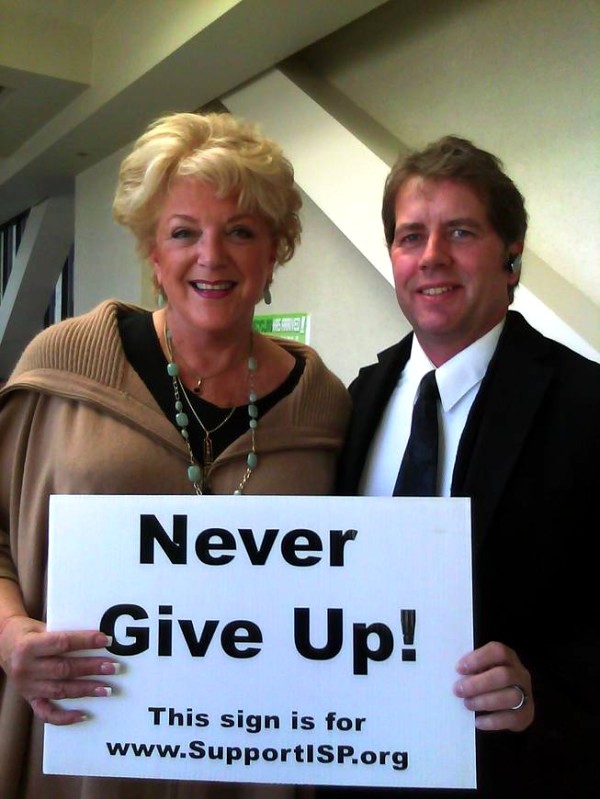
Las Vegan draws on near-death experiences to help others

Las Vegas Mayor Carolyn Goodman poses with Matthew Dovel, president of International Suicide Prevention, a nonprofit group that offers counseling services. |
November 19, 2011 - [lasvegassun.com] When he was 12 years old, Matthew Dovel nearly drowned while swimming in a backyard pool at a friend’s house. As he took his last breath and his lungs filled with water, Dovel, who now lives in Las Vegas, said he was overcome with terror. And then, he said, he felt himself being pulled from his body toward a white light and “the terror flipped to a pleasure I can’t describe.” As he floated through a surreal plane, Dovel relived the events of his young life — playing in the grass with friends, eating fried bologna sandwiches — before coming face to face with a silhouette that emerged from the light. “There was no doubt in my mind who it was. It was Jesus Christ,” said Dovel, who said he wasn’t religious at the time. Then Dovel felt himself shot back into his body lying on the side of the pool, a survivor of a near-death experience. The incident traumatized the young Dovel, and he struggled for the 13 years with what his brush with death meant. “I thought this world was hell after experiencing such a pure place,” he said. “I thought, why did I come back? What is this all about?” Dovel eventually fell into drugs and alcohol, developing a $1,000-a-day cocaine habit, dropping out of the military until one day, at age 25, he decided to kill himself, in hopes of returning to the place he had seen when he was 12. “I got to the point where I made a decision if I had to keep living this way, I didn’t want to live another day,” he said. After washing down handfuls of sleeping pills with a bottle of gin, Dovel prepared to die. He came close and had another near-death experience. Only this experience wasn’t like the first. Instead of going to a place he believes was heaven, he was sent to Hell. Dovel said he spent three days in a monochromatic existence, filled with a dense, hot atmosphere and reliving all of the times he had hurt others in his life. “I saw myself in the coroner’s office as my mother was identifying my body,” he said. But Dovel believes he was saved again, and awoke in his bed many miles from where he had tried to kill himself. His body was weak, but he was filled with a new conviction. He quit drugs and alcohol, and set out on a path to help others troubled by suicidal tendencies and those who were affected by the suicides of loved ones. “My passion at that point was to start helping people so they didn’t make the same decision I did,” he said.Nearly 25 years after his suicide attempt, Dovel is now the president of International Suicide Prevention, a nonprofit group that offers counseling services, as well as suicide scene cleanups. He moved to Las Vegas from Alaska shortly after his suicide attempt in search of work, and has stayed here ever since, attending UNLV and starting his organization. He said the toll of the recession that has resulted in thousands losing their jobs or their homes has made the city an unfortunate hot spot for suicides. He’s now working to raise the $250,000 needed to open a permanent facility to help people struggling with suicide, especially military veterans. He’s also working to create a documentary for the United States government about mental health issues affecting veterans and the rash of suicides they are resulting in. Near-death experiences have becoming an increasingly studied area in psychology and medical care, but there is still much that is unknown about them, said Raymond Moody, who has written several books on the subject and chaired the now-closed consciousness studies program at UNLV for several years. No two experiences are the same, Moody said, although there are similarities found in many. Feelings of peace, out-of-body experiences, immersion in a powerful light and encountering spiritual beings have all been reported in near-death experiences documented around the world. “Generally I would say it’s an experience which tends to be profound and spiritually interpreted,” Moody said. People who have near-death experiences, whether it’s while suffering cardiac arrest, nearly drowning or any of a wide variety of other situations, often come back changed, he said. “There’s an abundance of people who said prior to this they have no religious leanings, but when they come back they think there’s something to that,” he said. “It takes them away from the idea of denomination being important into something broader.” Although many attribute the experiences to biological causes — events being interpreted differently by the brain during a time of stress or oxygen deprivation — even after years of research and countless articles in medical journals, no definitive explanation has been put forward as to why people process these events the way they do, Moody said. “Things are seldom as simple as they first seem,” he said. “In reality we just don’t know the relationship between the immediate inner-sense of awareness we all have and the material substance of the body.” Dovel is less interested in exploring the mystery of near-death experiences and focuses on sharing his story to help others who are struggling in their lives. He’s [recently appeared] on ABC’s “Good Morning America” and a program about near-death experiences on the A&E channel. He’s working to update and republish a book about his life and struggle with suicidal thoughts. “Anyone can be depressed. Anyone can become suicidal,” he said. “Suicide is a permanent solution to a temporary problem, and I’m trying to help people understand that.”
Visit the [website] of Matthew Dovel Eyewitness to both heaven and hell. |